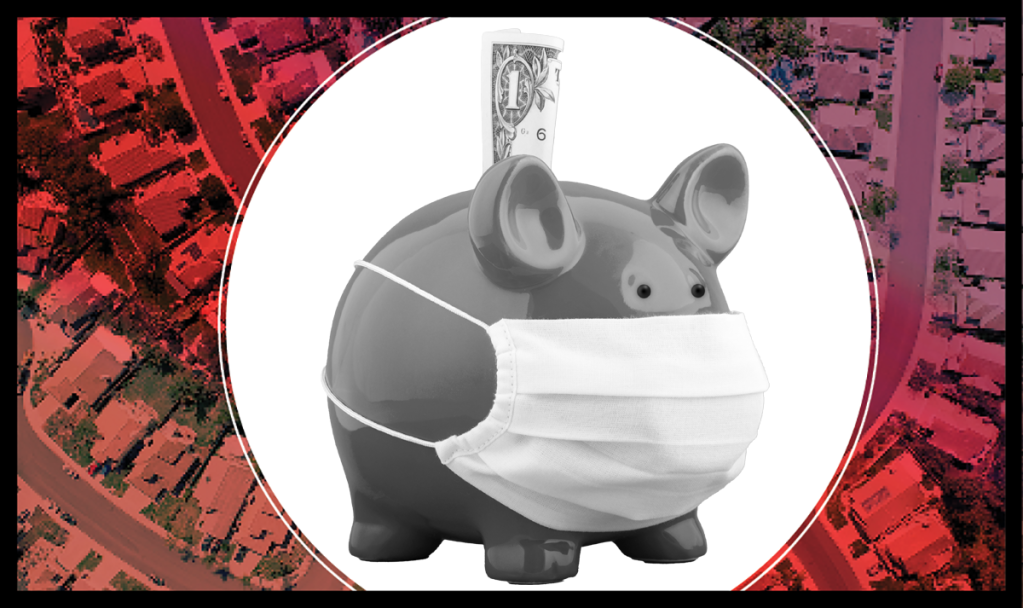
Several times a month, the National Multifamily Housing Council (NMHC) releases data from its Rent Payment Tracker, a measure of the number of tenants who have paid rent that month. Its most recent update, issued on Aug. 24, found that 90% of apartment households had made a full or partial rent payment by Aug. 20. Great news, right?

HW+ Columnist
Maybe not. The percentage of tenants paying rent declined 2.1 percentage points year-over-year. It slid month-over-month as well.
More importantly, the statistics come from a survey of 11.4 million professionally managed apartment units across the country. That means that small landlords – the mom-and-pop investors who own single-family homes for rent or perhaps a small apartment building – are not reflected in NMHC’s statistics. But it’s these landlords that are the most vulnerable to the economic impacts of COVID-19.
Why smaller landlords are at risk
Mom-and-pop investors are especially vulnerable if their tenants fail to pay rent. Many are undercapitalized and would be unable to pay their bills if a tenant became delinquent or vacated a unit.
“This is an industry that not only operates on small margins but now has a lot of new expenses involved – for maintenance and cleaning,” said Paula Cino, NMHC’s vice president of construction, development and land-use policy. “We expect to start to see differences in just how long a property owner can internalize these expenses.”
Cino said larger players in the industry have a greater level of financial sophistication, as well as access to other sources of funding if they need to raise capital. “You’re not going to see that in smaller properties, where you’re dealing with someone who only has a few units, it’s not a professionally run property and you don’t have a team of financial experts looking for other opportunities,” she added.
Smaller landlords are also disproportionately affected if tenants default. Consider the owner of a four-unit apartment building. If one tenant loses his job due to COVID-19 and is unable to pay rent, that reduces the building’s monthly rental income by 25% – which could make it difficult for the landlord to cover the carrying costs on the property.
Over the past few months, many tenants were able to meet their housing obligations due to economic stimulus payments such as the additional $600 a week paid under the Federal Pandemic Unemployment Compensation program. But those benefits expired at the end of July and, according to Zillow, the loss of that income will cause the percentage of renter households estimated to be severely housing burdened to skyrocket, from 3% to 41%, as their budgets are slashed. With negotiations in Congress to extend pandemic-related benefits stalled and eviction moratoria coming to an end, an eviction crisis is looming – which affects not only tenants but the small landlords who depend upon their rent to keep a roof over their own heads.
Tenant retention is key
Experienced landlords – of all sizes – know that it makes more sense to hold onto tenants than to replace them. That’s because turnover costs generally start at about $1,000 and can grow to $5,000, depending on the amount of capital replacements required, according to the National Apartment Association.
David Dweck is a real estate agent and investor in Boca Raton, Fla. who has 30 years of experience and manages his own portfolio of single-family rentals. Although his tenants generally consist of grocery store employees, landscapers, handymen and other blue-collar workers who don’t have as high of a risk of losing their jobs due to COVID-19, he has been faced with some tenants who approached him with financial problems.
He allowed each one to defer payment – without late fees – for 60 days. And each one paid the rent back in full.
“It’s not forgiveness,” Dweck said. “I’m empathetic to my tenants and to the situation right now. I will work with them. But this is my business, and I treat it as such. My tenants are not my friends, but I respect them and will work with them if they communicate with me.”
Dweck has another reason to work with his tenants – he can’t evict them now due to a statewide moratorium. “You can file an eviction case, but you cannot get a writ of possession,” he said. “And the writ is what you need.”
Establish rapport
One advantage small landlords have over large corporate investors is the ability to know and work directly with their tenants.
“Small landlords are often managing the properties themselves, so they have a personal relationship with their tenants,” said Daren Blomquist, vice president of market economics for Irvine, Calif.-based Auction.com. “They should leverage that personal relationship and be proactive – reach out and ask how they’re doing. That goes a long way.”
Scott Stuber, who lives in Denver, is a full-time investor. He and his husband own 15 single-family rental properties in Colorado, Florida and Ohio. All of his tenants are current.
“Even though we have a property management company, we develop a relationship with each tenant,” he said. “And when an issue comes up, I call them and talk to them. I think a tenant is going to be a little more diligent about paying their rent to someone they feel a personal connection to, as opposed to a big corporation.”
Stuber also sends gift cards to his tenants at Christmas and resolves their maintenance issues within 24 hours. “We try to be good to our tenants because ultimately, they’re paying our rent,” he said.
Cash is king
Whether a pandemic is raging or not, it’s essential that small landlords maintain sufficient reserves.
“Small landlords are more susceptible than larger institutional ones because they don’t have a capital cushion, and they’re less sophisticated in terms of their operations,” said Blomquist. “A lot of them are doing this as a side hustle in addition to their full-time job, so if they all of a sudden lost that income from rents they would have less chance of being able to cover the mortgage on their property.”
Both Dweck and Stuber recommend that small landlords have at least three months of reserves set aside to cover building costs and unexpected repairs. Stuber had to install new air conditioning units on several properties over the summer and, in the past, had to replace a roof. Of course, any landlord should already have on hand the tenant’s last-month rent and security deposit, and, provided that state law permits, can tap those funds if a tenant defaults.
But with tenants more likely to have trouble making their rent payments due to the end of the additional pandemic unemployment benefits, reserves can make the difference between small landlords paying their own mortgage payments – or facing foreclosure themselves.
Landlords with certain federally-backed mortgages may be eligible for forbearance on investment properties if their tenants cannot pay rent due to COVID-19 loss of income. It’s important to be proactive and seek help early.
Provided that an investor has equity in a property, it might also be possible to refinance the mortgage. With interest rates still at historic lows, that’s one way to reduce the monthly carrying costs on a rental property.






